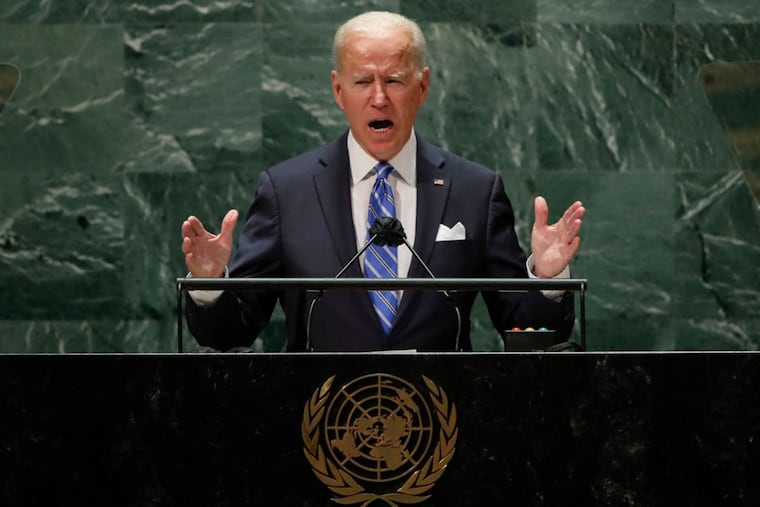Biden’s principled U.N. speech painfully contradicted by facts on the ground | Trudy Rubin
The president's U.N. call for global cooperation on COVID-19 and climate change and countering Chinese aggression was right on target — but is undercut by political divisions at home.

President Joe Biden sounded all the right notes in his Tuesday address to the United Nations General Assembly. He spoke on the need for global cooperation against pandemics and the climate crisis, as well as the need to counter rising autocracies by means other than warfare.
As an aspirational framework, the speech was admirable and spelled out what the United States should be aiming for.
Yet, Biden’s words seemed painfully divorced from the realities on the ground, especially after the White House botched the U.S. withdrawal from Afghanistan, and created a spat with France that further undermines NATO.
Those events raise questions about the Biden team’s foreign policy competence, and its commitment to allies. In addition, the divisive politics of GOP Trumpsters are amplifying the world’s questions about whether America can still lead.
Biden’s push for accelerated cooperation on COVID-19 was important, and he will hold a virtual summit on the topic Wednesday, on the sidelines of the U.N. meeting. Only a tiny fraction of the vaccine doses promised to poorer nations at a June summit of the world’s richest industrial nations has been delivered. Without a wider global vaccination rate, new variants of the coronavirus will flourish. And without U.S. leadership, a wider — and effective — global vaccination push won’t happen.
» READ MORE: Much of the world struggles with COVID-19 as Americans refuse the vaccine | Trudy Rubin
Yet, as with climate change, domestic U.S. political divisions are thwarting global progress on vaccinations. The undermining of the domestic vaccine process by leading GOP officials has diminished U.S. credibility worldwide.
Biden’s admirable vaccine rollout should have made America the world leader in fighting the virus. Instead, our pandemic of the unvaccinated shames us on an international stage. This makes allies question Americans’ sanity, along with the functionality of the American government and its competence to get things done.
So, friends and foes listened politely on Tuesday when Biden rightly called for global action on the coronavirus and the climate crisis, as well as on upholding the U.N. human rights charter and shaping new rules on advanced technology. But even our friends question how a viciously divided America can lead in the future. The adversaries gleefully watch America tear itself apart.
Moreover, Biden’s vocal emphasis on allies seemed strangely disconnected from recent White House maneuvers. There was no coordination with NATO allies on the decision to pull all U.S. troops out of Afghanistan by Aug. 31, even though the allies had 7,500 troops in the country, three times more than the Americans. The botched departure was a slap at NATO and raises questions about the competence of the current State Department leadership.
A further insult to a NATO ally soon followed, when Biden announced a new security accord with Australia and Great Britain that excluded France. Australia also junked a $66 billion deal for the nation to buy conventional French submarines in favor of a new contract for the U.S. and the U.K. to help the Aussies build nuclear-powered submarines. Yes, the new subs will be technologically superior, but French leaders were justifiably furious that they were not informed until the last minute.
This is no way to treat a historic ally, at a time when Biden is touting the critical importance of fellow democracies in competing with Beijing. No wonder many pundits are now comparing Biden’s dissing of allies with the tactics of Trump.
This brings us to the issue of China, which was a subtext of Biden’s U.N. speech (even though the word China was never used).
Biden stressed that “we are not seeking a new Cold War” but said that “the United States will compete, and we’ll compete vigorously, and lead with our values and our strength.” He added, “We’ll stand up for our allies and our friends and oppose attempts by stronger countries to dominate weaker ones, whether through changes to territory by force, economic coercion, technical exploitation, or disinformation.”
» READ MORE: After the Afghanistan failure, what is America prepared to fight for now? | Trudy Rubin
And he repeated one of the most important themes of his presidency: “We’ll lead not merely by the example of our power, but by the power of our example.” Or as he told the Munich Security Conference in February, “We’re at an inflection point between those who argue that … autocracy is the best way forward and those who understand that democracy is essential …”
In other words, unlike Trump’s saber-rattling and tariff wars, Biden recognizes that we can’t compete with China unless we up our game at home in infrastructure, education, and advanced technology. And we can’t counter Chinese claims that its autocratic model — and internal repression — best suits the 21st century unless we demonstrate that democracy still works.
His call for showing “the power of our example” was the most poignant moment of Biden’s speech because it spoke to the reality of the moment.
America is still potentially capable of global leadership — if it pulls together. The Biden team can overcome its early mistakes and reboot its methods of operation. And voters can still sideline the crazies who deny Biden’s win, oppose vaccines, and have the power to sink this country.
But if all of the above ends in failure, the ideals voiced by Biden at the United Nations will be remembered as so much hot air.